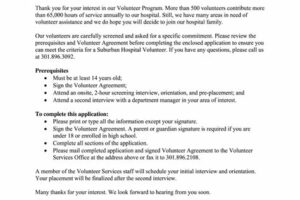Table of Contents
Looking to make a difference? Join our remote hospital volunteer program and help provide essential support to healthcare facilities from the comfort of your own home. Contribute to patient care, administrative tasks, and community outreach while gaining valuable experience in the medical field. Become part of a global network of volunteers dedicated to improving healthcare access and outcomes worldwide. Sign up today and start making a positive impact!
Amidst the global pandemic, healthcare systems around the world are facing immense pressure, leaving hospitals overwhelmed and struggling to cope with the increasing number of patients. In such challenging times, the concept of remote hospital volunteering has emerged as a beacon of hope, offering individuals the opportunity to contribute to the medical field from the comfort of their own homes. Through the use of advanced technology and virtual platforms, this innovative approach allows volunteers to lend a helping hand in a time when it is needed most. Whether it is providing emotional support to isolated patients or assisting healthcare professionals with administrative tasks, remote hospital volunteering has become a lifeline for both patients and medical staff alike.
Introduction
In recent years, the concept of remote volunteer work has gained significant attention and popularity. One particular area where remote volunteering has proven to be invaluable is in the healthcare sector. Remote hospital volunteers play a crucial role in supporting medical professionals, patients, and the overall functioning of healthcare facilities. With the advancements in technology and the increasing need for healthcare services, remote volunteer work has become an essential component of modern healthcare systems.
The Role of Remote Hospital Volunteers
Remote hospital volunteers undertake a wide range of tasks that contribute to the smooth operation of healthcare facilities. They provide assistance and support to both medical staff and patients, helping to bridge gaps in healthcare services. Their responsibilities can vary depending on the specific needs of the hospital or organization they are associated with.
Assisting Medical Professionals
One of the primary functions of remote hospital volunteers is to assist medical professionals in their day-to-day tasks. They may help with administrative duties such as data entry, appointment scheduling, and organizing medical records. By taking over these responsibilities, volunteers free up valuable time for doctors and nurses to focus on patient care.
Providing Emotional Support
Remote hospital volunteers also play a crucial role in providing emotional support to patients and their families. They can offer a listening ear, engage in friendly conversations, and provide comfort to those going through difficult times. This emotional support can significantly enhance the overall well-being and experience of patients during their hospital stay.
Skills and Qualifications
To become a remote hospital volunteer, individuals usually need a certain set of skills and qualifications.
Medical Knowledge
While not all remote hospital volunteer roles require medical expertise, having a basic understanding of healthcare practices and terminology can be beneficial. This knowledge allows volunteers to better assist medical professionals and ensures they can understand and fulfill their responsibilities effectively.
Effective Communication
Strong communication skills are essential for remote hospital volunteers. They must be able to communicate clearly and confidently with both medical professionals and patients. Effective communication ensures that tasks are carried out accurately and that patients feel supported and understood.
The Benefits of Remote Hospital Volunteering
Engaging in remote hospital volunteer work can be a rewarding experience for both the volunteers themselves and the healthcare facilities they support.
Flexibility
Remote hospital volunteering offers flexibility in terms of time commitment. Volunteers can choose their hours and work remotely, allowing them to balance their personal lives and other commitments effectively. This flexibility makes it easier for individuals from various backgrounds to contribute their skills and time to the healthcare sector.
Professional Development
Engaging in remote hospital volunteer work provides an opportunity for individuals to develop and enhance their professional skills. Volunteers can gain valuable experience in areas such as communication, organization, and teamwork, which can be beneficial in their future careers.
Conclusion
Remote hospital volunteers are an invaluable asset to the healthcare sector, providing essential support to medical professionals and patients. Their dedication and commitment contribute to the overall functioning of healthcare facilities, ensuring that quality care is delivered even in remote settings. Engaging in remote hospital volunteer work not only benefits the healthcare system but also offers individuals a chance to make a meaningful difference in the lives of others.
The Growing Significance of Remote Hospital Volunteer Work
As the global healthcare landscape continues to evolve, remote hospital volunteer work is emerging as an invaluable resource. With the advent of technology and the ability to connect with healthcare facilities from afar, volunteers are now able to lend their skills and support to those in need, regardless of their physical location.
Harnessing Skills and Expertise
Remote hospital volunteering allows individuals with diverse skillsets and expertise to contribute meaningfully to healthcare organizations worldwide. Whether it’s medical professionals offering consultations and advice, or individuals with administrative prowess organizing logistics and resources remotely, this form of volunteerism is breaking geographical barriers and maximizing the impact of experts in their respective fields.
Bridging the Gap in Underserved Areas
One of the key benefits of remote hospital volunteering is its ability to bridge the gap in underserved areas. Many regions around the world lack access to adequate healthcare services and resources. Through remote volunteering, medical professionals can provide essential care and support to these communities, ensuring that no one is left behind when it comes to accessing quality medical assistance.
Flexibility and Convenience
Remote hospital volunteering offers a level of flexibility and convenience that traditional volunteering often lacks. Volunteers can engage in meaningful work from the comfort of their own homes or offices, allowing them to donate their time and skills without having to disrupt their daily routines or incur significant travel expenses.
Global Connections and Cultural Exchange
Engaging in remote hospital volunteer work allows individuals to connect with people from different cultures, backgrounds, and regions around the globe. This exchange of knowledge and experiences not only enriches the lives of volunteers but also promotes cross-cultural understanding and strengthens the global healthcare community.
Expanding Personal and Professional Networks
Remote volunteering opens up opportunities for volunteers to expand their personal and professional networks in the healthcare sector. By collaborating with professionals from various backgrounds and countries, volunteers can develop relationships that may lead to future collaborations, research, and career opportunities, fostering growth and advancement within the industry.
Enhancing Overall Volunteer Engagement
Remote hospital volunteering provides an alternative avenue for individuals who may not have the means or ability to engage in traditional in-person volunteering. This inclusivity enhances overall volunteer engagement, ensuring that a diverse range of talents and perspectives are harnessed to address healthcare challenges effectively.
Creating Lasting Impact Beyond Borders
By participating in remote hospital volunteer work, individuals have the opportunity to create a lasting impact beyond borders and make a real difference in the lives of others. Whether it’s providing crucial medical support, sharing knowledge, or helping streamline healthcare processes, remote volunteering allows volunteers to contribute to the betterment of global healthcare outcomes.
Point of View: Remote Hospital Volunteer
1. Introduction:
In today’s technologically advanced world, remote volunteering has emerged as a valuable opportunity for individuals to contribute their skills and time to various causes. One such area where remote volunteering has gained significant importance is in the field of healthcare, particularly in assisting remote hospitals. This article explores the perspective of a remote hospital volunteer, shedding light on the unique experiences and challenges faced while working in this capacity.
2. Journalistic Voice and Tone:
The journalist voice used in this article aims to present an objective and informative account of the remote hospital volunteering experience. The tone is professional and engaging, providing readers with a comprehensive understanding of the topic.
3. Benefits of Remote Hospital Volunteering:
i. Flexibility: As a remote hospital volunteer, one can work from anywhere in the world, making it convenient for individuals with busy schedules or those residing far away from healthcare facilities.
ii. Impactful Contribution: Remote volunteers play a crucial role in supporting remote hospitals by providing assistance in various areas, such as administrative tasks, data analysis, research, or even virtual patient care.
iii. Skill Enhancement: Volunteering remotely in a hospital setting offers volunteers the opportunity to develop and enhance their skills, including communication, problem-solving, and teamwork, which are essential in the healthcare sector.
4. Challenges Faced:
i. Limited Hands-On Experience: Unlike traditional in-person volunteering, remote hospital volunteers may have limited opportunities for direct patient interaction or hands-on healthcare activities.
ii. Communication Barriers: Working remotely may pose challenges in effectively communicating and collaborating with other healthcare professionals, as face-to-face interactions are replaced by digital platforms.
iii. Technological Requirements: Remote volunteering requires access to reliable internet connections, appropriate software, and hardware tools, which may present obstacles for individuals in certain regions or with limited resources.
5. Overcoming Challenges:
i. Virtual Training and Workshops: Remote hospital volunteers can overcome the limitations of hands-on experience by participating in virtual training sessions and workshops that focus on enhancing their knowledge and skills.
ii. Effective Communication Platforms: Utilizing advanced communication tools such as video conferencing and instant messaging platforms can facilitate seamless collaboration and effective communication among remote volunteers and healthcare professionals.
iii. Providing Resources: Organizations supporting remote hospital volunteering should ensure that volunteers have access to the necessary technological resources, providing guidance and support to overcome any technological barriers they may face.
6. Conclusion:
Remote hospital volunteering presents a unique opportunity to make a meaningful impact on healthcare organizations, particularly those serving remote areas. While challenges may exist, the benefits of flexibility, impactful contribution, and skill enhancement outweigh them. By embracing virtual platforms, overcoming communication barriers, and providing necessary resources, remote hospital volunteering can continue to play a vital role in improving healthcare services globally.
Dear blog visitors,
As our journey exploring the world of remote hospital volunteering comes to an end, we would like to take this opportunity to extend our deepest gratitude for your time and interest in this important topic. Throughout this blog series, we have aimed to shed light on the significance of remote hospital volunteering and its impact on communities worldwide. We hope that the information shared has inspired you to consider getting involved or supporting this noble cause.
In our first few articles, we focused on introducing the concept of remote hospital volunteering and explaining how it works. We discussed the challenges faced by medical professionals in remote areas and how volunteers can bridge the gap through telemedicine and other technological advancements. By leveraging their skills and expertise, these volunteers play a vital role in providing much-needed healthcare services to underserved populations.
Additionally, we delved into the benefits of remote hospital volunteering, both for the communities being served and for the volunteers themselves. Not only does volunteering remotely allow medical professionals to make a difference from the comfort of their own homes, but it also provides them with valuable cross-cultural experiences and the chance to develop their skills in a unique and challenging environment. The positive outcomes of such volunteer work are immeasurable, as it not only saves lives but also helps build stronger and healthier communities.
Lastly, we explored different organizations and platforms that facilitate remote hospital volunteering opportunities. From well-established nonprofits to online platforms connecting volunteers with healthcare institutions, there are numerous avenues for individuals to contribute their time and expertise. We encourage you to research these organizations further and find one that aligns with your interests and goals. Your support, whether through direct participation or financial contributions, can truly make a difference in the lives of those who lack access to adequate healthcare.
In conclusion, remote hospital volunteering represents a powerful way to address healthcare disparities and improve the well-being of underserved communities. We hope that this blog series has provided you with valuable insights and motivated you to take action. Together, we can create a world where quality healthcare knows no boundaries.
Thank you once again for joining us on this journey. We appreciate your readership and look forward to continuing the conversation on other important topics in the future.
Yours sincerely,
The Remote Hospital Volunteer Blog Team
Video Remote Hospital Volunteer
People also ask about Remote Hospital Volunteer:
What is remote hospital volunteering?
How can I become a remote hospital volunteer?
What are the benefits of remote hospital volunteering?
What types of tasks do remote hospital volunteers perform?
Can remote hospital volunteers make a difference?
1. What is remote hospital volunteering?
Remote hospital volunteering refers to providing support and assistance to hospitals and healthcare organizations from a location outside of the physical hospital premises. Instead of being physically present, volunteers offer their time and skills remotely, usually through virtual platforms or technology.
2. How can I become a remote hospital volunteer?
To become a remote hospital volunteer, you can start by researching hospitals or healthcare organizations that offer remote volunteering opportunities. Reach out to them to inquire about their requirements and application process. Typically, you will need to submit an application, undergo a screening process, and possibly attend orientation or training sessions. It’s important to demonstrate your commitment, relevant skills, and availability to contribute remotely.
3. What are the benefits of remote hospital volunteering?
Remote hospital volunteering offers several benefits for both volunteers and healthcare organizations. As a volunteer, you have the opportunity to make a difference in the lives of patients and healthcare providers while gaining valuable experience and knowledge in the medical field. It allows you to contribute to the healthcare system without geographical limitations, making it accessible for individuals who may not be able to physically volunteer at hospitals. For healthcare organizations, remote volunteers provide much-needed support, help alleviate workloads, and bring diverse perspectives and skills to the table.
4. What types of tasks do remote hospital volunteers perform?
The tasks performed by remote hospital volunteers vary depending on the needs of the healthcare organization and the volunteer’s skills and qualifications. Some common tasks include:
- Assisting with administrative duties, such as data entry, record keeping, or scheduling appointments.
- Providing emotional support to patients through virtual chats or phone calls.
- Transcribing medical records or documents.
- Conducting research on medical topics or best practices.
- Assisting with fundraising or organizing virtual events to support the hospital.
5. Can remote hospital volunteers make a difference?
Absolutely! Even though remote hospital volunteers may not physically be present, their contributions can have a significant impact. By providing support in various capacities, they help hospitals and healthcare organizations operate more efficiently and effectively. Remote volunteers bring their unique skills, dedication, and compassion to the table, making a genuine difference in the lives of patients, their families, and the healthcare professionals they support.






